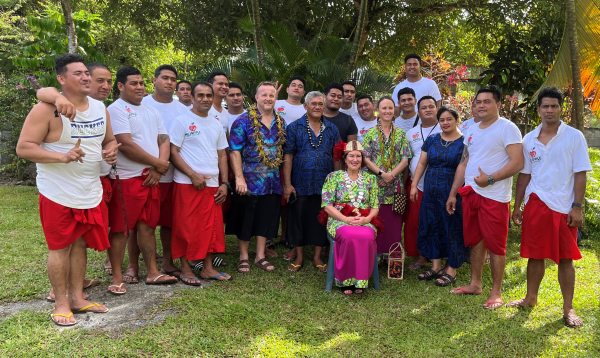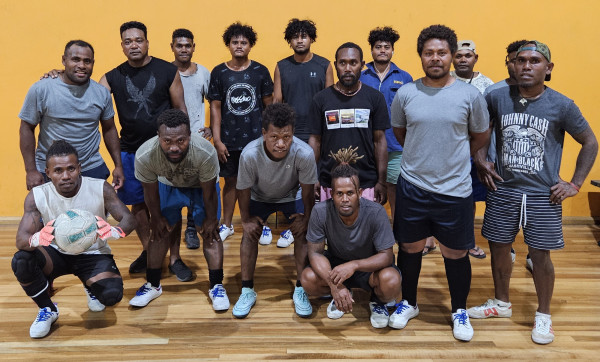Pacific Labour Mobility: A Pillar of Growth for Australian and New Zealand Industries
6 Nov 2023
Labour mobility is activated by unmet labour demand by employers in labour receiving countries. Employers therefore play a critical role in the success of Pacific labour mobility. Kerry McCarthy, a Pacific Australia Labour Mobility (PALM) employer and Gary Jones of Mr. Apple, a leading New Zealand Recognised Seasonal Employer (RSE) employer, shared their perspectives.
Kerry McCarthy and her family run a vegetable business on the Darling Downs, just under three hours west of Brisbane, Australia. They specialise in growing leafy greens and sell to both the Brisbane markets and big grocery chains in Australia. Mr. Apple is New Zealand's largest integrated grower, packer, and exporter of apples. Both companies have relied on Pacific workers since the inception of the labour mobility schemes, 2007 for New Zealand and 2012 for Australia. Kerry began with two workers in 2012 and now recruits around 60 workers from Solomon Islands. Mr. Apple recruits up to 1,300 workers per season from across the Pacific.

Mayor of Hastings District Council, To'asavili Sandra Hazlehurst (seated) who received a Samoan chiefly title from the Falealili District chiefs, along with Mr Apple staff and RSE workers from that district in May 2023.
Despite the varying scale and nature of the two companies' operations, labour shortages were equally a chronic constraint to the growth of their businesses. "We became involved in the Seasonal Worker Program due to necessity. At that time, we were an isolated farm and could not find reliable local labour to employ. We tried using labour hire companies from the Lockyer Valley but as we were on the end of the line in regard to location, we were always given last priority. If you hadn't already heard, in regional Australia there is a major labour shortage," said Kerry.
Similarly in New Zealand, Gary explained, "In the 1990s in New Zealand, there was a lot of people that were in seasonal roles working for the freezing works, processing, fishing, fencing, and farming and there were lots of New Zealanders who were moving around and could do seasonal work. But our communities and our jobs are completely changed, and New Zealanders are now more focusing on permanent urban roles and have become less available."
For businesses like these, Pacific labour mobility schemes provide a critical labour solution to underpin growth. Kerry shared, "It (PALM) has given us the confidence to expand our business, knowing that we can plan ahead, as our workers are going to be there for us and are going to stay with us for the whole season." For Mr. Apple, "RSE underpinned our ability to provide quality fruit to our consumer. It's allowed us to provide far higher quality to our consumers and the market. It's given New Zealand apples a brand of being the best apples in the world. And the Pacific people (workers) have been a pillar that's made the whole industry successful."
But behind the business transactions lies another layer to the success of Pacific labour mobility – the robust partnership between employers and local Pacific communities. Gary elaborated on Mr. Apples' partnerships in the Pacific stating that "we have a partnership with the governments and the peoples of the Pacific, which is very important to us. Those relations are quite critical and the opportunity for us to partner with the governments enables us to make sure that issues can be identified, and risks can be mitigated."

For smaller family businesses like Kerry's, this partnership is very close to home. Since 2012, Kerry has mostly recruited from a remote rural village in the Solomon Islands which has no road access and no electricity. Through her recruitments, she and her family have built a close bond with the local community. "My family visits the village; to witness the changes firsthand is overwhelming. All of this positive change has come from our small business. It boggles the imagination as to what can be achieved on a broader scale," Kerry stated. A few years ago, Kerry and her children's local school in Australia organised a school trip to the village in Solomon Islands. About 20 Australian high school kids and teachers experienced village life and donated support to the local school. Kerry shared that the experience significantly impacted the kids, and some have gone on to university to study development with a focus on the development needs of the Pacific, all based on their experience in Solomon Islands.
The strength of these partnerships has caused many employers to want to give back more. They see that their role extends beyond recruiting workers to being agents of change and development. Many employers, like Kerry, are interested in providing direct support to social services in Pacific countries. She stated that "I would keep lobbing the Australian Government and also personally try and get investment flowing into the Pacific, starting with the Solomons for early detection of preventable diseases for women, particularly breast cancer and uterine cancer, HPV vaccines. But it's difficult to know where to go, who to trust so that you know the 'boots are put on the ground' in the right area. It would be good for employers who want to contribute, but don't know how to do it to be guided towards reputable businesses that are already established on the ground in the Pacific."
Other employers, such as Mr. Apple, see the opportunity to support local private sectors to grow entrepreneurship and business development. Gary explained that many employers and communities in New Zealand are at the stage where they "would like to see how to partner communities where their workers have got some collective capital and who are saying where should we invest our money now. Can we create some commerce at scale that will help that whole community to deliver? A good example of this is Hastings District Council and Hawkes Bay Iwi Ngati Kahungunu signing a Sister District agreement with Falealili District in Samoa. Both these communities have benefited immensely from the RSE scheme. Now these communities are saying how can we work together and do even more".
The Pacific Labour Mobility Annual Meeting (PLMAM) 2023 in Port Vila, Vanuatu will host the first Employer Forum for RSE and PALM employers and will provide a platform for employers to not only consider how to further contribute to the success of labour mobility schemes but to also assess how they can better contribute to development in the Pacific.
Subscribe today
Don't miss our latest updates and news about PACER Plus